

Objective journalism and how readers judge importance. Sean Macheath Howell Aday, University of Pennsylvania Abstract An experimental design was used to test the “framesetting” effects of different news formats, and to provide a quantitative test of the influence of civic journalism on audience attitudes. Framesetting is posited as a new theory bridging agenda setting and framing research. It occurs when audiences not only ascribe importance to an issue covered prominently in the press, but simultaneously adopt the media frame of that issue.
In this study, 199 adults from the general population were randomly assigned to five conditions: two conventional journalism conditions employing an “objectivist” frame, two civic journalism conditions employing an “advocacy frame”, and a control condition. Subject Area Journalism|Speech Communication Recommended Citation Sean Macheath Howell Aday, "Public journalism and the power of the press: Exploring the framesetting effects of the news" (January 1, 1999). New defination of journalism. In response to the rapidly changing media environment, many schools and academic programs are offering novel approaches to journalism education.
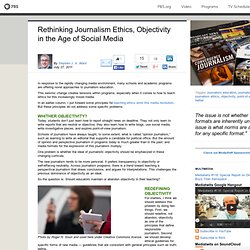
This seismic change creates tensions within programs, especially when it comes to how to teach ethics for this increasingly mixed media. In an earlier column, I put forward some principles for teaching ethics amid this media revolution. But these principles do not address some specific problems. Whither objectivity? Today, students don’t just learn how to report straight news on deadline. Schools of journalism have always taught, to some extent, what is called “opinion journalism,” such as learning to write an editorial that supports a candidate for political office. Good balances of Objectivity and non-objectivity. How readers can desifer information. Objective journalism is stressed to bring positive outcomes.
Monday, December 19, 2011 Metropolitan Staff Correspondent Eminent citizens and editors of different national dailies yesterday stressed the need for maintaining maximum impartiality and objectivity to take the level of journalism to new heights for bringing a positive change in the society.
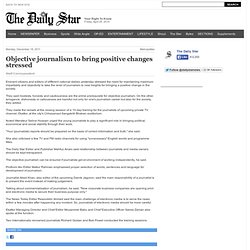
They said modesty, honesty and cautiousness are the prime prerequisite for objective journalism. On the other, arrogance, dishonesty or callousness are harmful not only for one's journalism career but also for the society, they added. They made the remark at the closing session of a 10-day training for the journalists of upcoming private TV channel, Ekattor, at the city's Chhayanaut Sangskriti Bhaban auditorium. Noted litterateur Selina Hossain urged the young journalists to play a significant role in bringing political, economical and social stability through their work.
"Your (journalists) reports should be prepared on the basis of correct information and truth," she said. Journalism and it's effect on Objectivity. Objectivity is an important aspect which needs to be considered in the practise of journalism. It is seen as a professional ideal which has become a troubling debate in modern journalism, leading to many questions. Does objectivity undermine the press as being the eyes and ears of the public? Objectivity is an unabtainable goal. By This page has been accessed since 29 May 1996.
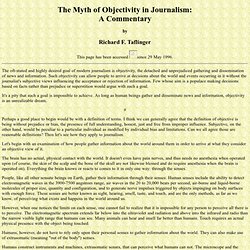
The oft-stated and highly desired goal of modern journalism is objectivity, the detached and unprejudiced gathering and dissemination of news and information. Such objectivity can allow people to arrive at decisions about the world and events occurring in it without the journalist's subjective views influencing the acceptance or rejection of information. Few whose aim is a populace making decisions based on facts rather than prejudice or superstition would argue with such a goal.
We can't have objectivity in Journalism. You read that correctly.

There is no such thing as objectivity in journalism. And it’s time to get over it. Every journalist has a political point-of-view and they don’t magically check that at the door the minute they land a job. Many pretend to pursue some noble cause of pure “objectivity,” but it is truly in vain. Every good journalist is informed about what the subjects they cover and it would be near-impossible to be informed and not have an opinion. Aside from outright disclosing a political bent (or as we do here at Mediaite, labeling an article a “column”), there are plenty of ways “objective” journalists can unwittingly reveal their biases.
Let’s say a conservative commentator spends a whole minute speaking with passion about some issue. There is also the more indirect form of tipping your hand: selection bias. I’ll start: If you read any of my posts labeled as “columns,” you might already know that I am a libertarian. Objectivity Broken Down. Negative Arguements of Journalism Objectivity. Volume 18, Number 4, 1993 Back to the Table of Contents © Canadian Journal of Communication Gilles Gauthier1 Université Laval If thought is to go far enough, the imagination must go further. If the will is to accomplish enough, it must imagine more. Among all the clichés that clutter up human minds, there is one which gives rise to a stir of approval in its audience each time it is sententiously pronounced: ``Objectivity does not exist -- in reporting.''
Stages of Objectivity. DAVID BROOKS There is some dispute about whether objectivity can really exist.
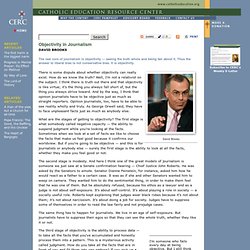
How do we know the truth? Well, I’m not a relativist on the subject. I think there is truth out there and that objectivity is like virtue; it's the thing you always fall short of, but the thing you always strive toward. And by the way, I think that opinion journalists have to be objective just as much as straight reporters. Opinion journalists, too, have to be able to see reality wholly and truly. Objectivity is something to strive for.
In “Losing the News: The Future of the News that Feeds Democracy,” published by Oxford University Press, Alex S.
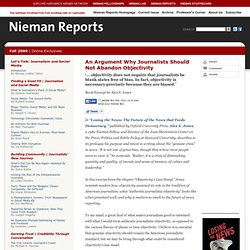
Jones, a 1982 Nieman Fellow and director of the Joan Shorenstein Center on the Press, Politics and Public Policy at Harvard University, describes in its prologue his purpose and intent in writing about the “genuine crisis” in news.